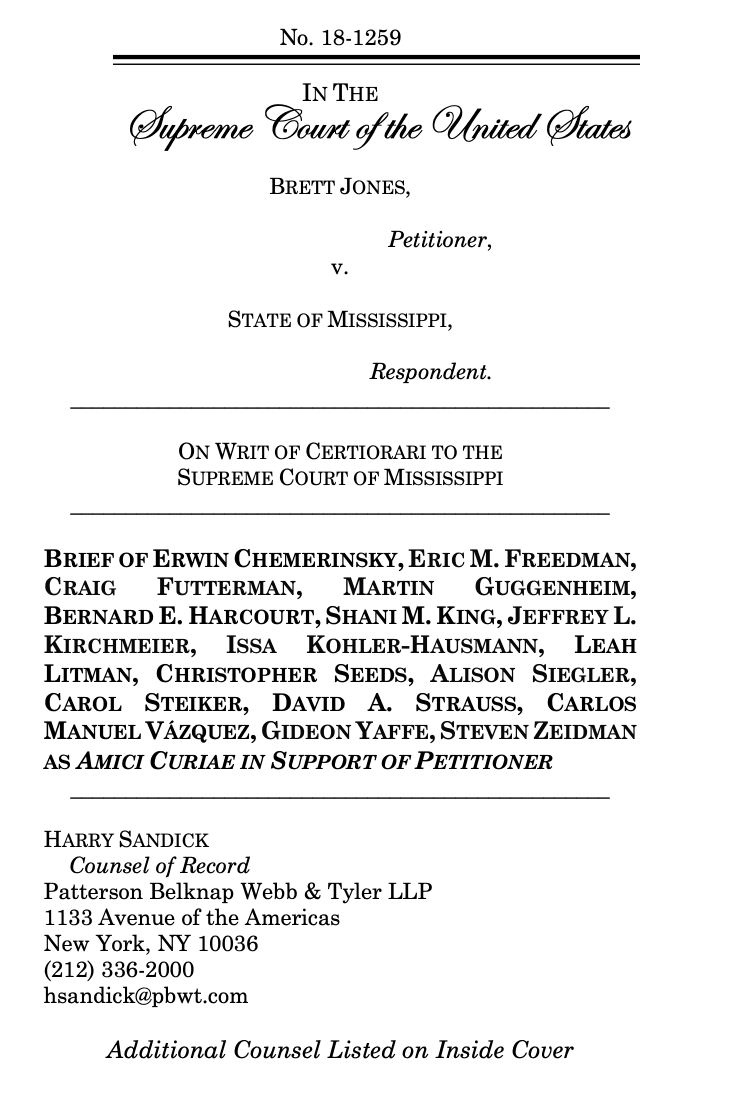
Summary of Argument
This case concerns the scope of the constitutional rule announced in Miller v. Alabama, 567 U.S. 460 (2012), and declared retroactive in Montgomery v. Louisiana, 136 S. Ct. 718 (2016). Miller established a substantive rule that renders life without parole disproportionate for the vast majority of juveniles in light of their “diminished culpability and heightened capacity for change.” Id. at 479. Under Miller, only those juveniles who are permanently incorrigible are constitutionally eligible for life without parole.
Petitioner Brett Jones, who was sentenced to life without parole for crimes committed as a juvenile, maintains that his sentence should be vacated because the sentencing court failed to find him permanently incorrigible.
To conform to Miller, a sentencing scheme must require the sentencing authority to separate juveniles who cannot be subjected to life without parole (juveniles whose crimes reflect “transient immaturity”) from the rare juveniles who can (those whose crimes reflect “irreparable corruption”). Miller, 567 U.S. at 479-80 (quoting Roper v. Simmons, 543 U.S. 551, 573 (2005)). A life-without-parole sentence is permitted solely when an offender is permanently incorrigible. Otherwise, juvenile offenders are constitutionally immune from receiving that sentence. Id.
Because the sentencing court here made no effort to address and engage with how Jones’s youth made him different than an adult defendant—and how those differences counseled against life without parole—the sentencing scheme fell short of what Miller requires.
Miller, after all, “did more than require a sentencer to consider a juvenile offender’s youth before imposing life without parole; it established that the penological justifications for life without parole collapse in light of ‘the distinctive attributes of youth.’” Montgomery, 136 S. Ct. at 734. To effectuate the substantive guarantee of proportionate punishment, this Court directed lower courts to evaluate if the child at issue is capable of rehabilitation, or is among the rare “permanent[ly] incorrigib[le]” children. Although the Court did not mandate the procedure necessary to ensure that only “permanently incorrigible” children were sentenced to life without parole, it warned that this lack of guidance “should not be construed to demean the substantive character of the federal right at issue.” Id. at 735. On the contrary, the Court made clear that to impose a life without parole sentence on children whose crimes reflect transient immaturity would be a “deprivation of a substantive right.” Id. at 734.
Amici respectfully urge the Court to clarify that a sentencer must engage with youth and its attendant circumstances in order to distinguish between youthful immaturity and irreparable corruption before condemning a juvenile to life in prison, and that evidence of actual rehabilitation militates against a finding that a particular juvenile offender is among the “rarest of children, those whose crimes reflect ‘irreparable corruption.’” Id. at 726. Such a clarification is necessary to ensure implementation of this Court’s substantive rules and uphold the rule of law.
Open Amicus Brief as PDF